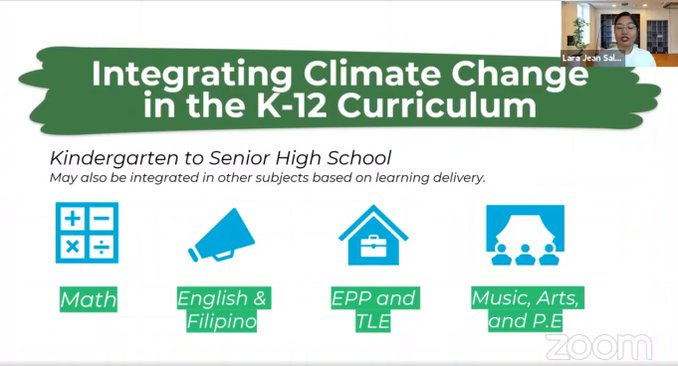
March 18, 2021 Thursday

The Department of Education supports the need to integrate climate change concepts in the K-12 Program to increase knowledge and appreciation of climate science among youth. Photo from the Facebook livestream of the 38th Episode of Stories For A Better Normal.
MANILA, 19 March 2021 — Filipina leaders in climate and disaster risk resilience highlighted the extraordinary roles of women in the field of disaster risk reduction (DRR), climate change adaptation (CCA), and in national pandemic recovery during the 38th episode of “Stories for a Better Normal: Pandemic and Climate Pathways,” with the topic “Juana Laban sa Krisis sa Klima at Pandemya: Kaya!”
The online conversation hosted by three-term Senator, now Deputy Speaker and Antique Representative Loren Legarda, was a special episode in celebration of the National Women’s Month. Atty. Lesley Jeanne Cordero, Senior Disaster Risk Management Specialist of World Bank; Ms. Lara Jean Salaysay, a Climate Reality Leader and Project Development Officer of the Department of Education (DepEd); and Ms. Louise Mabulo, a United Nations Environment Programme (UNEP) Young Champion of the Earth 2019, joined as guests.
“We've been advocating for women in politics and governance, and this is nothing new today in times of pandemic. I'm so happy that many have taken up the action to embrace women in governance and women in resilience,” said Legarda, who is a UNISDR Global Champion of Resilience, UNFCCC National Adaptation Plan Champion, and Commissioner of the Global Commission on Adaptation.
The Filipina champions of resilience shared their trailblazing work in DRR, CCA, and in national pandemic recovery.
"We need to communicate better. We need to speak in a language that is understood by the people affected by disasters, as well as the local government units so they can participate, they can help, and they can contribute in the rehabilitation and recovery efforts," said Atty. Cordero.
"Ang programa natin sa climate change education ay para sa ating mga learners, kumbaga ito ay child-centered. Gusto po natin na sila ang bida, sila ang nagsasalita, at sila din yung kikilos para sa climate change adaptation at mitigation. Naniniwala po tayo na sa climate crisis, lahat tayo ay may pag-asa, lalung-lalo na ang kabataan. Sa DepEd, tinutulungan natin sila na i-unlock ang kanilang potential upang solusyunan o mag-adapt at mitigate sa climate change," said Salaysay.
“We’re breaking down the negative stigma associated with agriculture. We think of agriculture as associated with poverty, unsustainability, and failure, which is problematic, hindi to maganda para sa mga farmers natin at industries. What we’re trying to do is to show people and yung mga kabataan ngayon that farming is cool, and it’s really fun, and that it can be used as a means for green stewardship,” said Mabulo.
Legarda emphasized the need to harness the strength of women in reducing social vulnerability and increasing local capacity to ensure the sustainability, inclusivity and resilience of local, and national development pursuits. By ensuring that they are able to adapt to climate and disaster risks, and be leaders and active communicators, this will also allow them to be champions of resilience.
“I hope the issue of climate, DRR and resilience will go viral. When will that happen? I want to meet more and to be more with young women like you. Let us continue doing our COVID recovery attuned to the climate pathway during this pandemic,” Legarda concluded.
As an online discussion to promote health, environmental consciousness, and climate-adaptive practices, "Stories for a Better Normal" aims to change the mindset of individuals, families, and communities by demonstrating ways in which a ‘better normal’ can be realized within our communities.
This online discussion is organized in partnership between the Office of Deputy Speaker Legarda and the Climate Change Commission, with support from the Department of Education, Philippine Information Agency, Philippine Commission on Women, Institute for Climate and Sustainable Cities, The Climate Reality Project-Philippines and Mother Earth Foundation.